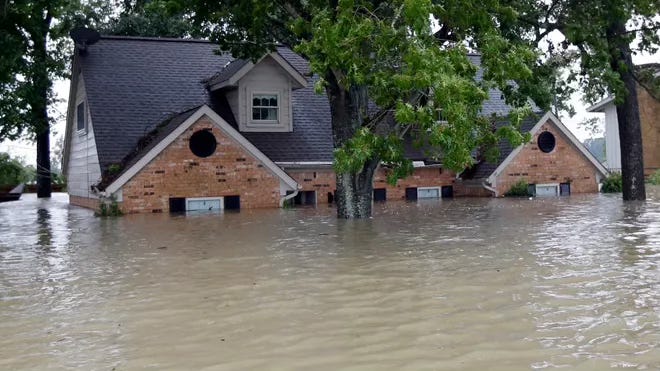Short Stack: Flood Insurance
As Hurricane Milton slams into the West Coast of Florida this week, thousands of homes that never should have been built where they are will be flooded, and we have government to thank.
Like any free market, a free market for insurance is incredibly efficient. Furthermore, prices matter. In a free, unregulated and unsubsidized market, a price conveys extensive information about supply, demand, production costs, marketing expenses, transportation and delivery costs, risk, and much, much more.
In a truly free market—where individuals negotiate with each other and choose for themselves with whom to trade, when to trade, and on what terms—the price of any good or service is almost miraculous. One number contains an enormous amount of information about what people value, what they do not, and the productivity required to meet their desires.
If a picture is worth a thousand words, then a price is worth a detailed analysis of an entire industry and the demographics and sociology of the people it serves. This holds true in the insurance market: when people seek to insure against significant and potentially costly risks, insurance premiums will be high, which deters many individuals from taking those risks.
Floods
When individuals want to build homes in flood-prone areas, for example, typical insurance companies either refuse to offer flood insurance or charge prohibitively high premiums.
Why? Because insurance companies understand that flood-prone areas...flood. It is virtually certain that a floodplain will flood; the only question is when. It’s simply a matter of time. And when it floods, the insurance company is on the hook to repair or replace the damaged homes.
In a truly free market, the high cost of flood insurance alone would disincentivize many people from building homes in flood-prone areas.
But we do not have truly free markets here. We live in the postmodern, progressive United States of America, where most markets—including insurance markets—are highly regulated and subsidized.
So what happens in highly regulated and subsidized markets? In the postmodern progressive U.S., people insist they have a "right" to "affordable flood insurance." They want to build homes on floodplains that have pretty vistas, but do not want to pay for expensive flood insurance.
Can you guess who steps in? If you said government, ding, ding, ding! You win a prize.
Government
Our postmodern—and postconstitutional—progressive federal government says:
"Yes, indeed, you are entitled to affordable flood insurance, and we’ll provide it because those greedy private insurance companies won’t! Don't worry, if the premiums you pay cannot cover all the damage caused by catastrophic floods, we’ll just make taxpayers subsidize the rest. So, go ahead, build big, expensive homes in the middle of Hurricane Alley. We have you covered."
And they do. They build many of them.
Thus, we have yet another example of our postmodern progressive government incentivizing destructive, wasteful, and irresponsible behavior: progressive government is why more homes continue to be built in areas that are susceptible to hurricane flooding, rather than fewer.

It will surprise no one to learn that the National Flood Insurance Program (NFIP) was signed into law by President Lyndon Johnson in 1968 as part of the blatantly unconstitutional Housing and Urban Development Act. Fueling crony corruption is what Johnson meant by building a “Great Society.”
If the Father of the Constitution, James Madison, knew that the federal government has been incentivizing people—with subsidies—for over fifty years to build homes in flood-prone areas because some Americans “feel” that they have a “right” to “affordable flood insurance,” he would roll in his grave.
Spending Other People’s Money
Keep that in mind as Hurricane Milton slams into the West Coast of Florida this week, flooding thousands (or millions?) of homes that never should have been built where they are.
In a regime of personal liberty and free markets—where insurance is entirely private, unsubsidized, and unregulated—people would quickly learn not to build homes in unsafe flood zones because they would be responsible for repairing and replacing their homes every time a hurricane destroyed them.
However, in a postmodern progressive regime, they are not risking and spending their own money. They are risking and spending your money. The incentives change dramatically when it’s other people’s money on the line!
Those houses that now sit in the favorite paths of hurricanes were built because you are subsidizing the costs of repairing or replacing them after they are destroyed. And many millions of Americans say this is a sign of “progress.” This is one of many progressive programs they will never consider reducing. Ever. Government programs can only get bigger and more expensive no matter how unreasonable or wasteful they might be. That has become the American way.





